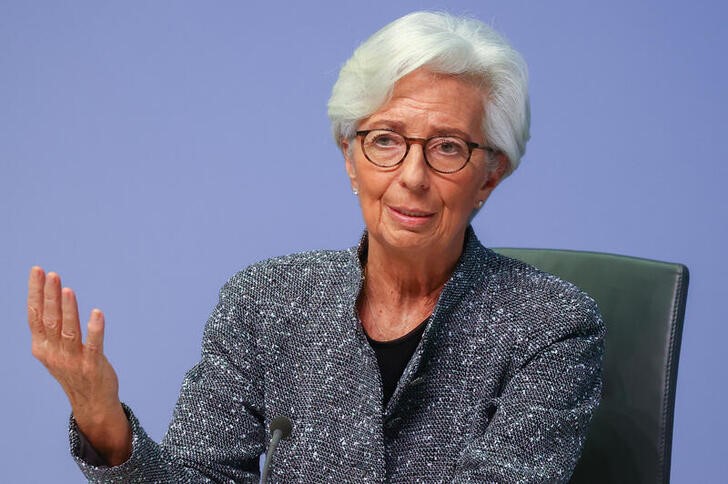By Balazs Koranyi and Francesco Canepa
FRANKFURT (Reuters) - The European Central Bank approved a bigger-than-expected expansion of its stimulus package on Thursday to prop up an economy plunged by the coronavirus pandemic into its worst recession since World War Two.
Just months after a first raft of crisis measures, the ECB said it would raise bond purchases by 600 billion euros ($674 billion) to 1.35 trillion euros and that purchases would run at least until end-June 2021, six months longer than first planned.
It also said it would reinvest proceeds from maturing bonds in its pandemic emergency purchase scheme at least until the end of 2022.
ECB President Christine Lagarde scotched speculation that the bank could follow the U.S. Federal Reserve in buying sub-investment grade bonds, however, saying that option was not even discussed by policymakers.
The announcement, which comes just weeks after Germany's Constitutional Court ruled that the ECB had already been exceeding its mandate with a longstanding asset purchase programme, prompted a rally in the euro and bond markets.
"Today's easing measures were another illustration that the ECB means business and stands ready to do whatever is necessary to help the euro area survive the corona crisis in one piece. The ECB will do its part, and it hopes the governments will do their part," Nordea analysts said in a note.
The bank dramatically revised downward its baseline scenario for euro zone output this year to a contraction of 8.7% from the modest 0.8% rise it had forecast only in March.
It predicted a partial rebound with growth of 5.2% next year and 3.3% in 2022 but Lagarde told a news conference that signs of any recovery so far were "tepid" and that risks to its baseline projection were on the downside.
"The euro area economy is experiencing an unprecedented contraction. There has been an abrupt drop in economic activity as a result of the coronavirus pandemic and the measures taken to contain it," Lagarde said.
She said she was confident that a "good solution" could be found on the legal stand-off with Germany's top court.
As the economic downturn runs deeper and longer than expected, governments are running record deficits to cushion the impact of the pandemic, putting a greater burden on the ECB to soak up this new debt and keep borrowing costs manageable.
Lagarde welcomed what she called the "ambitious" proposal of the European Commission for a 1.1 trillion euro budget for the bloc for 2021-27 with an extra recovery fund worth 750 billion euros.
Cash-rich Germany, which can borrow at negative rates for up to 20 years, separately unveiled a 130 billion euro ($145.85 billion) stimulus package late on Wednesday.
The ECB earlier committed to buying up to 1.1 trillion euros worth of bonds this year. But even record purchases have struggled to bring down yields on debt issued by countries on the 19-nation bloc's periphery, particularly Italy, hit hard by the virus and already struggling with a large debt burden.

More bond buys are also becoming urgent because the ECB is on track to exhaust its purchase quota by the autumn, raising some doubts about its capacity or willingness to buy the amounts needed to keep yields down.
